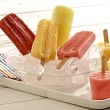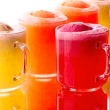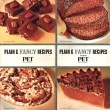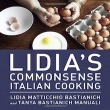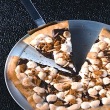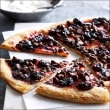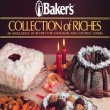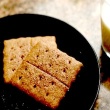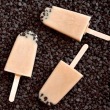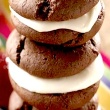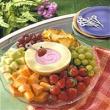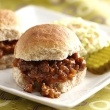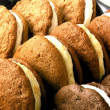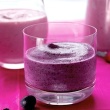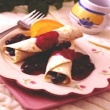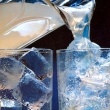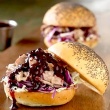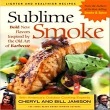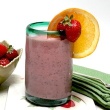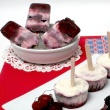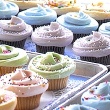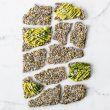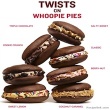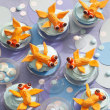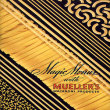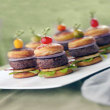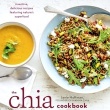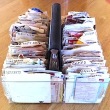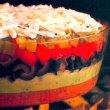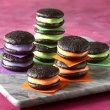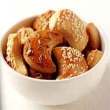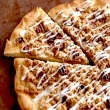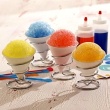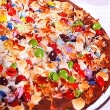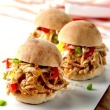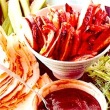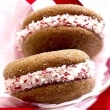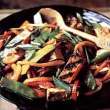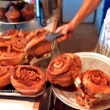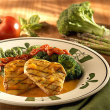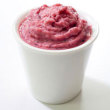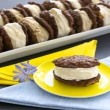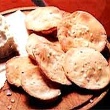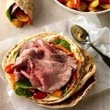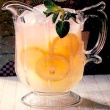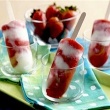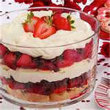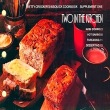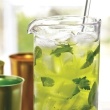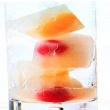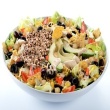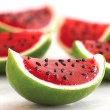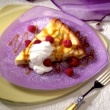Sugar Eggs
rec.crafts.misc/Sarah Nuttshaw/2003
This recipe was my mother's from the late 60's. My experience so far is that you have to wait longer to scrape the insides. I live in Arizona and it is pretty dry here...they don't dry enough in the time specified in the recipe. I've left them overnight and been able to scrape the next morning. I would ask my mother her thoughts on the whole thing, but she is no longer with us. She made quite a few of these when I was little. I've only recently found this recipe she used after trying, unsuccessfully, others.
Materials Needed:
2-piece plastic egg molds
Superfine granulated sugar
Cake decorating kit
Small Easter decorations (Easter bunnies, Easter grass, jelly beans, cutouts, etc..)
Fill egg-mold halves with water to get a measure of the volume of the mold. For large molds, mix 1-tablespoon ice water per 1 cup granulated sugar. For smaller molds, mix 1-teaspoon ice water per 1/3 cup of sugar. Or 1 1/2 teaspoons ice water per 1/2 cup sugar. For example, some large molds have a capacity of 4 cups of liquid: therefore you would use 4 cups granulated sugar and 4 tablespoons of ice water.
Mix water and sugar thoroughly with a spoon. Then squeeze a small amount of dampened sugar in your hand; if imprint of fingers remains, sugar is the right consistency to mold. If mix is too wet, add more sugar. If too dry, add more ice water. Next firmly pack the sugar into the egg-mold halves.
Immediately remove the sugar eggs as follows: Cover the top of the mold with a square of cardboard (or a plate). Then, with one hand firmly under the mold and the other on the cardboard, invert in the mold so the cardboard is now on the bottom. Gently squeeze the mold at sides and lift carefully from the sugar-egg half. Repeat for other half. Allow large eggs to set for 3 hours (no longer) and small ones for 1 hour.
When set, hollow out the middle of the eggs halves, leaving the shell 1/2-inch to 3/4-inch thick. Cut a semi circle with a knife at the wide end of each half to form a peephole about 2-inches in diameter. Or, if you prefer an upright egg, cut a semi circle from the middle edge of each half (or you may decide to leave the eggs solid, as we did. Allow egg halves to dry overnight.
After they have dried, arrange a tiny Easter scene in one half with grass, jellybeans, little fuzzy chicks, cutouts or whatever you decide to use. You are now ready to decorate your egg. Prepare my making a batch of ornamental frosting.
Ornamental Frosting
Store any leftover frosting in a covered jar in the refrigerator for another day's use.
1 egg white
1/8 teaspoon cream of tartar
1 3/4 cups sifted 10X confectioners/powdered sugar
Food Colorings
Beat egg white and cream of tartar until foamy in a small bowl. Beat in 10X sugar gradually until frosting stands in firm peaks and is stiff enough to hold a sharp line when cut with a knife.
Divide into custard cups and tint with food colorings in the pastel colors you plan to use.
Secure eggs halves together by spreading frosting around the top edge of the bottom half of the egg: then gently press top half down on it, holding firmly in place for a minute or two. Cover the seam and edge of peephole with decorative frosting. Then decorate egg with rosettes, leaves, bows and swirls in varying pastel shades by using different tips from your decorating kit and following the directions that accompany it. (You may want to practice on a bit on a piece of paper before decorating your egg).
Helpful Hints
1. Do not let dampened sugar set more than 3 hours before hollowing. The sugar will tend to become too hard and difficult to scrape out.
2. Hollowed -out sugar should not be reused for another egg. The dampened sugar will cause air bubbles and make a rough outer surface for the new egg.
3. Place leftover sugar on a cookie sheet, let it dry completely, crush with a rolling pin and use as regular sugar.
4. Only one mold is needed for each size, even when making many eggs, because the solidly packed sugar is turned out of the mold immediately.
5. If you want tinted eggs, tint water with food coloring before mixing with sugar.
6. If you want to make a decorative base for your egg with the frosting, you may find it easier to insert the Easter scene after the egg and the base have been completed.
7. You should be able to buy a beginners cake-decorating kit at your local supermarket.
rec.crafts.misc/Sarah Nuttshaw/2003
This recipe was my mother's from the late 60's. My experience so far is that you have to wait longer to scrape the insides. I live in Arizona and it is pretty dry here...they don't dry enough in the time specified in the recipe. I've left them overnight and been able to scrape the next morning. I would ask my mother her thoughts on the whole thing, but she is no longer with us. She made quite a few of these when I was little. I've only recently found this recipe she used after trying, unsuccessfully, others.
Materials Needed:
2-piece plastic egg molds
Superfine granulated sugar
Cake decorating kit
Small Easter decorations (Easter bunnies, Easter grass, jelly beans, cutouts, etc..)
Fill egg-mold halves with water to get a measure of the volume of the mold. For large molds, mix 1-tablespoon ice water per 1 cup granulated sugar. For smaller molds, mix 1-teaspoon ice water per 1/3 cup of sugar. Or 1 1/2 teaspoons ice water per 1/2 cup sugar. For example, some large molds have a capacity of 4 cups of liquid: therefore you would use 4 cups granulated sugar and 4 tablespoons of ice water.
Mix water and sugar thoroughly with a spoon. Then squeeze a small amount of dampened sugar in your hand; if imprint of fingers remains, sugar is the right consistency to mold. If mix is too wet, add more sugar. If too dry, add more ice water. Next firmly pack the sugar into the egg-mold halves.
Immediately remove the sugar eggs as follows: Cover the top of the mold with a square of cardboard (or a plate). Then, with one hand firmly under the mold and the other on the cardboard, invert in the mold so the cardboard is now on the bottom. Gently squeeze the mold at sides and lift carefully from the sugar-egg half. Repeat for other half. Allow large eggs to set for 3 hours (no longer) and small ones for 1 hour.
When set, hollow out the middle of the eggs halves, leaving the shell 1/2-inch to 3/4-inch thick. Cut a semi circle with a knife at the wide end of each half to form a peephole about 2-inches in diameter. Or, if you prefer an upright egg, cut a semi circle from the middle edge of each half (or you may decide to leave the eggs solid, as we did. Allow egg halves to dry overnight.
After they have dried, arrange a tiny Easter scene in one half with grass, jellybeans, little fuzzy chicks, cutouts or whatever you decide to use. You are now ready to decorate your egg. Prepare my making a batch of ornamental frosting.
Ornamental Frosting
Store any leftover frosting in a covered jar in the refrigerator for another day's use.
1 egg white
1/8 teaspoon cream of tartar
1 3/4 cups sifted 10X confectioners/powdered sugar
Food Colorings
Beat egg white and cream of tartar until foamy in a small bowl. Beat in 10X sugar gradually until frosting stands in firm peaks and is stiff enough to hold a sharp line when cut with a knife.
Divide into custard cups and tint with food colorings in the pastel colors you plan to use.
Secure eggs halves together by spreading frosting around the top edge of the bottom half of the egg: then gently press top half down on it, holding firmly in place for a minute or two. Cover the seam and edge of peephole with decorative frosting. Then decorate egg with rosettes, leaves, bows and swirls in varying pastel shades by using different tips from your decorating kit and following the directions that accompany it. (You may want to practice on a bit on a piece of paper before decorating your egg).
Helpful Hints
1. Do not let dampened sugar set more than 3 hours before hollowing. The sugar will tend to become too hard and difficult to scrape out.
2. Hollowed -out sugar should not be reused for another egg. The dampened sugar will cause air bubbles and make a rough outer surface for the new egg.
3. Place leftover sugar on a cookie sheet, let it dry completely, crush with a rolling pin and use as regular sugar.
4. Only one mold is needed for each size, even when making many eggs, because the solidly packed sugar is turned out of the mold immediately.
5. If you want tinted eggs, tint water with food coloring before mixing with sugar.
6. If you want to make a decorative base for your egg with the frosting, you may find it easier to insert the Easter scene after the egg and the base have been completed.
7. You should be able to buy a beginners cake-decorating kit at your local supermarket.
MsgID: 3123783
Shared by: Betsy at Recipelink.com
In reply to: Recipe: Candy Recipes (26)
Board: Daily Recipe Swap at Recipelink.com
Shared by: Betsy at Recipelink.com
In reply to: Recipe: Candy Recipes (26)
Board: Daily Recipe Swap at Recipelink.com
- Read Replies (26)
- Post Reply
- Post New
- Save to Recipe Box
ADVERTISEMENT
Random Recipes from:
Desserts - Candy, Chocolate
Desserts - Candy, Chocolate
- Almond Roca (made with crackers)
- Chocolate Bark (using saltine crackers)
- Sesame Brittle with Orange Flower Water (microwave)
- Baker's One Bowl Peanut Butter Fudge (swirled, microwave)
- Laduree Strawberry and Orange Flower Water Marshmallows
- Mashed Potato Candy
- French Silk Fudge
- Quick Fondant Wafers (using pectin) (1974)
- Baked Sugar Crackers (using Keebler Club Crackers)
- No Bake Chocolate Peanut Butter Bites
UPLOAD AN IMAGE
Allowed file types: .gif .png .jpg .jpeg
Allowed file types: .gif .png .jpg .jpeg
POST A REPLY
Post a Request - Answer a Question
Share a Recipe
Thank You To All Who Contribute
Post a Request - Answer a Question
Share a Recipe
Thank You To All Who Contribute
POST A NEW MESSAGE
Post a Request - Answer a Question
Share a Recipe
Thank You To All Who Contribute
Post a Request - Answer a Question
Share a Recipe
Thank You To All Who Contribute


